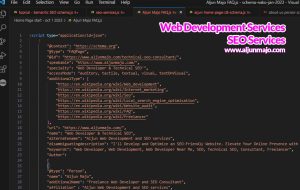The Ultimate Guide to Freelance Success: Tips, Tricks, and Expert Advice

Freelancing has become the go-to career choice for millions of people around the world. It’s no wonder why; you get to be your own boss, set your own hours, and choose projects that align with your passions. But let’s face it – becoming a successful freelancer isn’t always as easy as it seems. Whether you’re just starting out or looking to level up your game, there’s always room for improvement.
That’s where we come in! I’ve gathered some top-notch advice from seasoned freelancers who’ve been there, done that, and learned a thing or two along the way. So if you’re ready to take your freelancing career to the next level, buckle up and dive into these tips and tricks to help you navigate this exciting but sometimes challenging world.
Table of Contents
Establishing Your Niche And Brand
Establishing your niche and brand is crucial to becoming a successful freelancer. By honing in on your specific skills and industry, you’ll be able to target clients more effectively and stand out from the competition. To find your niche, consider your strengths, passions, and expertise. Additionally, research market demand for various services to ensure a need for what you’re offering. Once you’ve identified your niche, it’s time to build a solid personal brand that showcases your unique value proposition.
Creating a compelling brand requires consistency across all platforms where potential clients may encounter you – from social media profiles to portfolios and websites. Make sure your messaging is clear, professional, and targeted toward the audience you want to attract. Invest time crafting an engaging bio that highlights your skills, experiences, and personality while showcasing the benefits of working with you. By clearly establishing your niche and presenting a cohesive brand image, you’ll be well on your way to finding success as a freelancer.
Mastering Time Management And Productivity
Now that you’ve honed in on your niche and built a solid brand, it’s time to tackle another crucial aspect of freelancing: mastering time management and productivity. As a freelancer, you’re essentially your own boss, which means you’ll need to manage your time effectively and stay productive to meet deadlines and achieve success.
To excel in time management, start by setting clear goals for yourself. Break down your projects into smaller tasks with specific deadlines so you can track your progress more easily. Prioritize these tasks based on urgency and importance, focusing first on those that will impact your overall objectives most. Implement a routine or schedule that works for you – this may involve blocking out times during the day when you’re most productive or designating specific days for specific types of work. Remember to be realistic about how long specific tasks will take, as overestimating can lead to unnecessary stress and burnout. Furthermore, don’t forget to allocate some time for breaks – stepping away from your work periodically can help recharge your mental batteries and ultimately boost productivity in the long run.
Building A Strong Portfolio and Online Presence
Picture this: you’ve honed your skills and are ready to take on the world of freelancing, but potential clients can’t see the value you bring to the table. What’s missing? A strong portfolio and online presence! Building a robust collection of your work and showcasing it professionally online is crucial for attracting clients and establishing yourself as an expert in your field.
Start by curating diverse projects highlighting your abilities, versatility, and expertise. Include detailed descriptions of each project, emphasizing your challenges and how you overcame them. This will give potential clients insight into your problem-solving skills and adaptability. Next, create an engaging website or join reputable platforms like LinkedIn or Behance to showcase your portfolio. Ensure that your online presence is consistent across all channels – from social media profiles to personal branding – making it easy for potential clients to find and recognize you. Don’t forget to keep updating your portfolio with new projects and accomplishments as they arise; staying current is vital in the ever-evolving world of freelancing!
Networking and Finding Clients
As you continue to polish your portfolio and establish your online presence, it’s crucial not to overlook the importance of networking and actively seeking out clients. While a well-crafted portfolio can draw potential clients to you, proactively building connections will help you find new opportunities in the freelancing world.
Networking can be done both online and offline. Online platforms such as LinkedIn, Twitter, and industry-specific forums offer excellent opportunities for connecting with potential clients and other professionals in your field. Attend industry events, conferences, or workshops to meet people who might need your services or refer others to you. Join local meetups or networking groups related to your profession – not only do these allow you to make connections, but they also help you stay updated with trends and news within your niche. Remember that referrals from satisfied clients can significantly boost your reputation; therefore, don’t be afraid to ask for testimonials or recommendations from happy customers.
Setting Your Rates and Managing Finances
Picture this: you’re sitting at your desk, surrounded by invoices and spreadsheets, trying to make sense of your finances as a freelancer. The numbers seem overwhelming, and setting your rates and managing your money seems daunting. Fear not! With careful planning and organization, setting your rates and managing your finances can become a manageable task that will ultimately lead to the success of your freelance career.
Begin by researching the market rate for the services you provide in your industry. Find out what others with similar experience and skills are charging, and aim for a competitive rate that fairly reflects your expertise. Once you have established a baseline rate, be open to adjusting it based on factors such as project complexity or client budget constraints. On the financial management side, create a budget that covers personal and business expenses such as marketing, equipment upgrades, or maintenance. Track all income and expenses diligently using accounting software or a simple spreadsheet to help monitor cash flow and make informed financial decisions.
Remember that consistency is key when setting rates and managing finances as a freelancer. By regularly evaluating your rates in light of industry trends or changes in demand for specific skill sets, you can ensure that they remain competitive while still reflecting the value of your work. Additionally, maintaining organized financial records will make tax season less stressful and empower you with insights into optimizing profitability for long-term success in freelancing. So take charge of these crucial aspects today – watch as they pave the way towards greater freedom, flexibility, and control over your professional life!
Frequently Asked Questions
How Do I Maintain A Healthy Work-Life Balance As A Freelancer?
Maintaining a healthy work-life balance as a freelancer can be achieved by setting clear boundaries between work and personal time, creating a dedicated workspace, and managing your time effectively. It’s essential to establish a routine that includes regular working hours and breaks, while also allowing for flexibility when necessary. Remember to prioritize self-care by setting aside time for exercise, hobbies, and socializing with friends and family. Additionally, learning to say no to projects or clients that may infringe on your personal time can help you maintain a balanced lifestyle.
What Are Some Strategies To Cope With The Unpredictability And Instability Of Freelance Income?
Dealing with the unpredictability and instability of freelance income can be challenging, but implementing a few strategies can help alleviate financial stress. It’s essential to create and stick to a budget, factoring in both your monthly expenses and potential fluctuations in your income. Establishing an emergency fund is also crucial; aim to save at least three to six months’ worth of living expenses as a safety net. Additionally, diversifying your client base and service offerings can provide multiple revenue streams, reducing dependence on any single source of income. Regularly re-evaluating your rates and negotiating better terms with clients can further improve financial stability. Finally, staying disciplined with invoicing and following up on unpaid invoices helps maintain a steady cash flow.
How Can I Protect My Intellectual Property And Ensure I Am Fairly Compensated For My Work?
To safeguard your intellectual property and secure fair compensation for your work, it’s crucial to establish clear agreements with clients before starting a project. Draft detailed contracts outlining ownership rights, payment terms, and usage restrictions for the work you produce. Register trademarks, copyrights, or patents where applicable to reinforce legal protection. Additionally, consider using non-disclosure agreements (NDAs) when sharing sensitive information or ideas with potential clients or collaborators. Keeping accurate records of all communications and project files will also help support any potential disputes or legal claims regarding your intellectual property and compensation.
How Do I Handle Difficult Clients Or Disputes Over Project Deliverables And Expectations?
When handling difficult clients or disputes over project deliverables and expectations, it is crucial to maintain open communication, remain professional, and establish clear guidelines from the outset. By setting specific expectations and milestones, you can reduce misunderstandings and ensure both parties are on the same page. If conflicts arise, approach them calmly and objectively, offering possible solutions to reach a mutually beneficial resolution. Remember that maintaining a good working relationship is key; sometimes compromises may be necessary for the sake of long-term collaboration.
Are There Any Legal And Tax Considerations Specific To Freelancing That I Should Be Aware Of?
When considering legal and tax aspects specific to freelancing, it’s important to be aware of self-employment taxes, business structure options, and potential liability concerns. As a freelancer, you’re responsible for paying your own taxes, which may include both income tax and self-employment tax. Choosing the right business structure, such as a sole proprietorship or limited liability company (LLC), can impact your tax situation and personal liability. Additionally, make sure to understand any relevant laws related to contracts, intellectual property rights, and privacy policies in order to minimize potential disputes with clients.
Conclusion
In conclusion, navigating the world of freelancing can be challenging, but it’s crucial to establish a healthy work-life balance and implement strategies to manage financial uncertainty. Always prioritize the protection of your intellectual property and approach disputes with demanding clients professionally and calmly.
Furthermore, staying informed about legal and tax considerations unique to freelancing is essential, as this knowledge will empower you to make informed decisions in your career. By following these steps, you’ll be well-prepared to thrive as a freelancer, reaping the rewards of self-employment and enjoying its freedom and flexibility.
Lastly, if you need a skilled freelance web developer and technical SEO expert, feel free to reach out to me. I am eager to assist you in elevating your online presence and optimizing your website’s performance, ultimately contributing to the success of your business.


